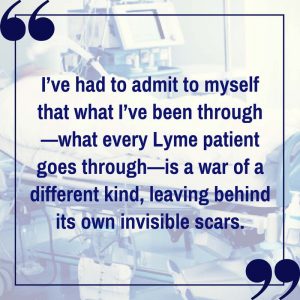by Susan Pogorzelski
#MyLymeLife
How could I compare my experiences with Lyme disease to those who had endured worse?
It’s taken me a long time to get to this point, to be able to admit that what I’ve been through in the face of this illness has been traumatic. The words “trauma” and “suffering” were always reserved for other people—people who faced unspeakable horrors, visibly fighting their demons with inconceivable bravery. How could I dare use those words when so many had been through so much more? How could I compare my experiences with this disease to those who had endured worse?
The truth is, Lyme disease is a traumatizing experience. From the initial diagnosis through recovery, it leaves its scars in a way few other illnesses do—invisible wounds from daily battles permeating our everyday life. I didn’t want to admit this. I wanted to get through recovery and move on. I thought I had, for a while.
When I went into remission after two and a half years of treatment, I was eager to move forward with my life, pursuing dreams with vigor and tackling challenges with ease now that I was presumably healthy. Slowly, those years of pain and fatigue, of isolation and loneliness, of questioning my own mortality and ability to survive passed into memory, becoming a part of my history. I had let it go; I had moved on, and I wasn’t looking back.
But then came the relapse, and with it returned all of the pain, uncertainty and old fear. Suddenly, I was facing again what I had fought so hard against, and I plunged back into depression, wondering if I would survive a second time. Back again was the familiar pain and the fatigue draining every ounce of energy from my body. Back again was the paranoia and anxiety. I couldn’t bear to leave my house. Back again was the knowledge that I had to keep fighting relentlessly for fear that I might succumb to this disease if I let up for just one second.
Hour after hour, day after day, year after year of fighting is enough to make anyone grow tired and weary, but the hardest part of Lyme disease is that it never relents. In the beginning, you’re fighting for a diagnosis among feelings of betrayal from the very doctors you entrusted to help save your life. They question your symptoms, tell you it’s nothing more than a virus, pat you on the shoulder and tell you you’re just sensitive, and slowly you begin to wonder if maybe they’re right. Slowly, you begin to lose faith in the medical profession and, worse, in yourself.
When you finally do get your diagnosis, it’s like an oasis in the desert, and you’re so grateful to put a name to the enemy that has stolen moments from your life that you wear it like a badge of honor. Suddenly you want to scream, “Here’s proof! Look at what I’ve been through! Do you understand now?” But you’re met with blank stares and nonchalant anecdotes about that time your colleague’s aunt had Lyme and it wasn’t that bad. They question your character, spread rumors that you’re not really that sick, and you fight for your reputation and livelihood, at the same time desperately trying to build awareness for a disease so few understand, so someone can finally understand you.
Then comes treatment and recovery, the biggest battle of all. Every single minute is a fight for your life, and you never feel safe because you’re always gearing up for another battle as you struggle against this invisible enemy inside you. This enemy which has slowly drained you, stealing moments and breaths until there’s hardly anything left and you feel like you’re only existing, not living.
That’s how the relapse broke me. I couldn’t relax because I never felt safe. I couldn’t have fun because I’d forgotten how. I couldn’t look too far ahead because I feared I would always be one step away from being that sick again. I felt shattered by these years of suffering, plagued by a fear that it wouldn’t end.
Lyme disease is traumatizing to the mind and spirit, especially when you suffer for so long. Day in and day out, we live with a disease that does its best to bring us down, and every second, we’re fighting to survive. Even when we get a break, even if we reach remission, the memory of this fight is still there in the back of our minds—a knowledge that any minute we might have to arm ourselves with renewed strength, renewed courage, and fight again.
In the year since my relapse, I’ve had to face this fear for what it is: trauma due to the many nuances of this illness. I’ve had to admit to myself that what I’ve been through—what every Lyme patient goes through—is a war of a different kind, leaving behind its own invisible scars.
Like any trauma, it takes time to heal. Like any struggle, it can transform us into something more positive, if we let it. Because the good thing about scars is they show us where the cracks in our armor are, and our experiences help us fill them up with something stronger, someone new.
Opinions expressed by contributors are their own.
Susan Pogorzelski is the author of “The Last Letter,” a semi-autobiographic novel about her struggle to find a Lyme diagnosis and subsequent journey through recovery.

GLA
Admin at GLA


